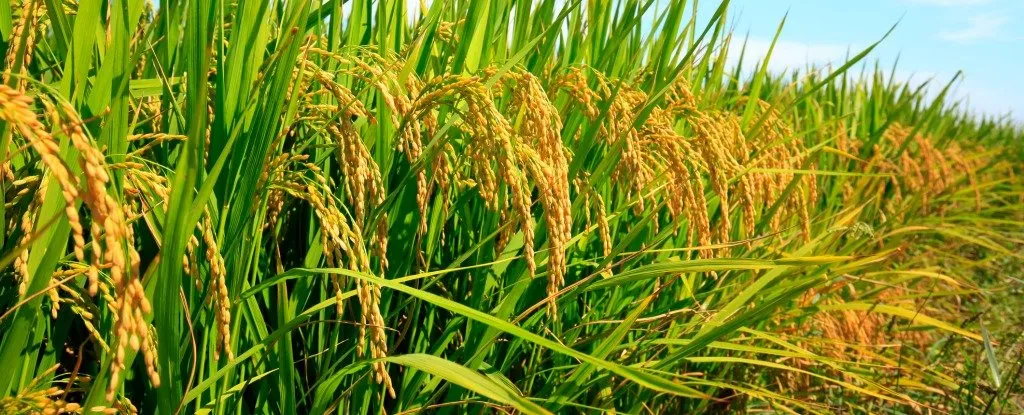
Human-caused ozone harming substance discharges undermine to make rice less nutritious, researchers said in an investigation discharged Wednesday, raising a stressing plausibility over the staple sustenance thing for billions of people.
Rice, the researchers found, contains bring down levels of key vitamins when developed in the midst of high centralizations of carbon dioxide, the most widely recognized of the ozone harming substances driving environmental change.
"On the off chance that we don't do anything, at that point yes, there is this potential for significant negative effects on human wellbeing," said Kristie Ebi, a general wellbeing specialist at the University of Washington in Seattle and one of the creators of the examination, which likewise included scientists at organizations in China, Japan, Australia and the United States, including at the US Agriculture Department.
The examination, led in Japan and China, inspected 18 rice assortments in open air tries in which the plants were subjected to environmental carbon dioxide centralizations of 568 to 590 sections for every million.
Current focuses are around 410 sections for every million, except they're developing at around 2 sections for each million consistently - and could achieve the examination's levels in the later piece of this century.
Rice represents "around 25 percent of every single worldwide calorie," as per the examination, which was distributed in the diary Science Advances. It was driven by Chunwu Zhu of the Chinese Academy of Sciences.
The investigation found that at the high fixations, the harvest's substance of the vitamins B1, B2, B5 and B9 all declined, including by as much as 30 percent for B9 (folate).
The examination additionally affirmed already found decreases in protein, iron and zinc.
"There's been ponders in the course of recent years for the significance of these B vitamins," Ebi said.
"One that decays with higher CO2 focuses is folate. Also, we realize that folate lacks in pregnant ladies can bring about kids that have different birth abnormalities. So they're basically essential, especially for maternal and tyke wellbeing, however for every one of us."
It combines up with late research additionally proposing that another major worldwide staple product, wheat, could see bring down yields as the planet warms.
The results for wheat are fixing to rising temperatures, however with rice, the prompt issue seems, by all accounts, to be the developing centralizations of carbon dioxide in the environment.
Plants pull carbon from the air and develop, and they will pull a greater amount of it as fixations rise.
The issue is that different parts of their digestion may not keep pace, implying that they would attract less supplements from soils as they develop, and proportionately more carbon.
It's the adjustment in this cosmetics of the plant itself that could, thus, convert into changes in its nutritious substance for the individuals who devour it.
"CO2 is plant nourishment as in it influences plants to develop more," said Lewis Ziska, another investigation creator with the Department of Agriculture.
"In any case, frequently when plants develop more, that doesn't really imply that you get a similar nature of the plant."
Along these lines, Ebi and Ziska stated, rice could in reality as of now be losing a portion of its wholesome substance under ebb and flow climatic carbon dioxide focuses - however the examination has not been done now to affirm that.
It could require contrasting the present rice with rice from decades prior, which would mean utilizing tests that have been saved in some way or another.
Furthermore, it isn't simply rice. The fundamental instrument here could include different plants and other nourishment staples, said Chuck Rice, an educator of Agronomy at Kansas State University who remarked on the investigation for the Post.
"I haven't seen anything about the vitamins, that was new in this paper," Rice stated, "however different reports show, or ate slightest model and have done some lab appraises, that somewhere in the range of 2 to 10 percent less protein content for grains under [an] hoisted CO2 condition."
Rice said comes about like these could enormously undermine endeavors to enhance worldwide nourishment.
"I'm here in Columbia, they're taking a shot at biofortified vegetables, beans and rice… for micronutrient lacks, iron, zinc, and especially for places like Africa or Asia," he said.
"Also, what this does is simply nearly invalidate a portion of those additions that we're endeavoring to make for inadequacies in the populace that is in effect most hurt lamentably."
In reality, the exploration fits an undeniably regular topic in atmosphere discoveries, which is that poor people and impeded universally would be hit hardest by these sorts of changes, and would be slightest ready to modify or expand their eating methodologies with a specific end goal to get supplements in different ways.
"When you consider who devours as an extent of their eating routine the most starch, it by and large is poor people, in all nations," Ebi said.